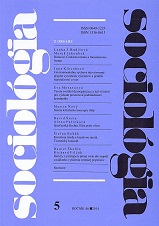Bariéry v prístupe k pitnej vode ako aspekt sociálneho vy-lúčenia rómskej populácie
Barriers to Access to Potable Water as an Aspect of Social Exclusion of the Roma Population
Author(s): Daniel Škobla, Richard FilčákSubject(s): Social Sciences
Published by: SAV - Slovenská akadémia vied - Sociologický ústav
Keywords: Roma ethnicity; drinking water; local field of power
Summary/Abstract: Barriers to Access to Potable Water as an Aspect of Social Exclusion of the Roma Population. The main objective of this study is to explore and critically apply Bourdieu's concept of the field to identify barriers that hinder access to clean, safe sources of drinking water for the Roma population at a local level. The main barriers identified are power asymmetries and the lack of representation for those who have difficulty in accessing drinking water. The study combines a quantitative, empirical description of the water infrastructure in so-called Roma settlements with a qualitative account of structural inequalities in the local field of power. The authors suggest that equal access to water infrastructure should be assured through Roma-focused affirmative action, and recommend strengthening both universal social policies and central decision-making to neutralize the partisan interests and biased decision-making that are sometimes present at the local level. Sociológia 2014, Vol. 46 (No. 5: 620-637)
Journal: Sociológia - Slovak Sociological Review
- Issue Year: 46/2014
- Issue No: 5
- Page Range: 620-637
- Page Count: 17
- Language: Slovak

